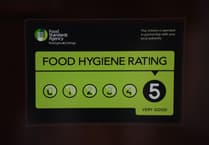Around 25% of people admitted to hospital for other health concerns also have a diagnosis of dementia or a cognitive impairment. Dementia co-ordinators provide essential support to these patients and their families by providing specialist dementia care alongside the teams tending to the patients’ other needs.
Research shows that the pandemic particularly affected people who have dementia, with the resulting social isolation and decreased stimulation. This has increased the likelihood of distress and disorientation which can be particularly difficult in a hospital setting.
In response to the pandemic, the RUH’s service has been redesigned to improve patient experience, including the introduction of a new dementia support worker role, to maximise the number of patients the service is able to support and increase the one-on-one time each patient receives.
Astrid Siddorn, Dementia Co-ordinator said: “We know that being in an unfamiliar environment, such as a hospital, can be difficult for those who have dementia at the best of times but during and following the pandemic, our team recognised how important it was to upscale the care we provide.
“We particularly wanted to focus on delivering care tailored to each individual, that’s why we introduced the dementia support worker role to the team. A key part element of the role is about befriending - getting to know our patients on a one to one basis to help us provide truly personalised care.
“Knowing what people like and dislike, their routines and family backgrounds helps to reduce distress for people with dementia and can also help to overcome any problems with communication.”
The dementia support worker also facilitates group and one-to-one activity sessions and provides a key link between patients and their families, something which was especially crucial during the pandemic when visiting was restricted at the hospital.
Julia Davies was appointed as a dementia support worker in November 2020. Julia said: “This is a really fantastic role that makes a difference to patients in so many ways. Some of my highlights since becoming a dementia support worker include dancing with a patient on her birthday, laughing and chatting with a patient whilst helping them complete a jigsaw puzzle and enjoying some fresh air and light exercise with patients in the hospital gardens.
“These interactions make a big difference to patients who have dementia and are also really important for their families too. The little things make a huge difference and give families some piece of mind when they can’t be with their loved one.”
The team recently came first place at the RUH’s Improving Patient Experience Awards in recognition of the positive impact their new way of working has had on patients and their families. The judges reviewed patient and family feedback to help them reach their decision and remarked on how responsive the team has been to the increased needs of dementia patients as a result of the pandemic.
“We were really pleased to be recognised with an Improving Patient Experience Award. We’ve worked really hard to reconfigure the team in a way that best meets our patient’s needs and we’re excited to continue building on this working and making further improvements in the future,” said Astrid.
The RUH’s Cancer Support team was awarded second place for going above and beyond to personalise care by, for example, compiling personalised wellbeing resources and undergoing additional psychological support training to better support patients’ emotional needs.
Third place went to the Outpatient Musculoskeletal and Pelvic Health Service for innovating the way the service was delivered during the pandemic and continuing to act on patient feedback to improve the virtual service.
The Improving Patient Experience Awards are an annual celebration at the RUH to recognise teams for going above and beyond to improve care for their patients.



.jpg?width=209&height=140&crop=209:145,smart&quality=75)

Comments
This article has no comments yet. Be the first to leave a comment.